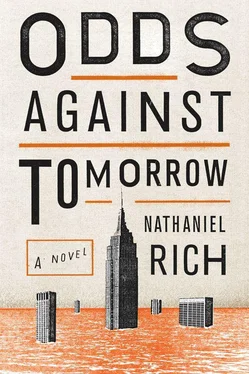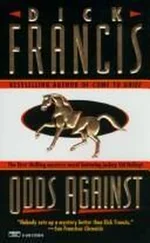He had no great advice to offer his clients about this fact. He just wanted them to understand the likelihood that they would be incinerated shortly.
“You won’t be able to say no one warned you,” he said.
He could see the increasing discomfort, even alarm, on their faces. It was evident in the tight set of their jaws, their crimson eyes, their yellowish skin, the fingernail marks in their palms. He realized that the more strongly he believed his prophecies, the more strongly they did. It helped that anxiety was in the air. No longer was it free-floating. It had coalesced, settling into something heavier, tangible — a sludge of anxiety. You had to wade through it on the way to work; it sucked you down from underfoot, like quicksand.
In this light, the young, low-level financial associates who met with him suddenly seemed pitiful. They didn’t realize what they’d gotten themselves into. Like him, they had come from distant cities and towns to New York, hoping to make their fortune. Out of their element, without anyone to advise them, they bunked in dormitories dressed up as apartments in overpriced midtown high-rises and spent excessively on sushi, online dating, tailors, executive haircuts. But they were blind to their fate. They didn’t realize they were being fed like virginal sacrifices into the maw of history, of twenty-first-century global capitalism, of vast, complex systems that were wildly beyond their control. He wanted to help them. In his consultations he would explain to these young financial associates why, despite the suitsandties-Christmasbonuses-gymmembership-nightclubbottleservice-steakhousesplurges, they still woke up in the middle of the night with violent images in their brains and screams building in their chests. Mitchell’s scenarios reassured them that they had good reason to be afraid.
The drought helped. The weathermen, their credibility shot, were taking a beating. Out of desperation — or panic — they began to predict rain. They pointed to tropical storms in the Caribbean: imposing Irma, ominous Ophelia, promising Philippe — but all veered out to sea before making the Atlantic Seaboard. They pointed to a chain of hurricanes developing off the coast of Mauritania, another promising development. The Eurasian snow cover was higher than the previous year, broody cumulonimbus clouds were gathering just two hundred miles off Florida, and the sea surface temperatures in the tropics were at ten-year lows. Hopeful signs all, but still there was no rain. Faith in the meteorological industry fell to all-time lows — not that it had far to fall. Even the local anchors were getting into the act, using their meteorologists for easy punch lines. One of New York’s most beloved weathermen, Channel 4’s “Big” Henry D., normally a frothsome, jovial personality, was reduced to euphemistic expressions of melancholy and long, half-coherent lamentations. “When the heavens are shut up and there is no rain because your people have sinned,” said Henry D. one night, the anchorwoman gaping gobsmacked across the news desk, “then what can we do? O Lord, what can we do?”
It made sense to Mitchell. Frightened people didn’t want bromides, expressions of hope, happy predictions. They craved dread, worst-case scenarios, end times. What would the future cost them? They wanted to hear that the price would be exorbitant.
This was excellent news for FutureWorld. FutureWorld would provide. FutureWorld would take their money. Oh God yes, we would.
* * *
The new office consisted of eight linked rooms on the fourth floor of a tower at Columbus Circle. This glass monolith seemed only marginally safer than the Empire State Building, though Mitchell had at least dissuaded Charnoble from choosing an office on the twenty-seventh floor. It had dawned on him that Charnoble’s priority wasn’t safety, but the appearance, at least to an untrained eye, of safety.
“Uptown,” Charnoble kept saying. “Always wanted to make it uptown.”
“What do you mean?”
“Downtown is for the wealthy,” he said, clarifying. “But uptown? Central Park South? That’s for the rich .”
Charnoble began to hum “Uptown Girl” through his fat, grotesque jackal grin. It occurred to Mitchell that Charnoble’s mouth had been put there by mistake — it was much too wide for his face.
With business growing, FutureWorld had to expand. Charnoble’s first hire was Mary Tewilliger, a woman in her late sixties and a secretary of the old mold. She had worked in Brumley Sansome’s Risk department since the twentieth century. She won Mitchell over with her wrinkled forehead, proud chin, sagging elbows, and the agitated, bushy gesticulations of hair on either side of her face. Because she insisted upon being addressed as Ms. Tewilliger, behind her back Charnoble referred to her simply as Tewilliger. Or Old Tewilliger.
A week later Charnoble introduced Mitchell to a second hire. Jane Eppler was just out of Wharton Business, with a philosophy degree from Princeton. She had won an award for her senior essay on Antisthenes, the original Cynic. Jane was attractive in the pert, suburban, midwestern tradition, and she spoke with a sensual underbite. She seemed self-conscious about her pedigree, so she tried to baffle expectations by using coarse language. Yet some vestigial attachment to her Catholic upbringing seemed to prevent her from using actual obscenities. The first time they met, she told Mitchell that the elderly male professors at Wharton were “predatory, palsied panty sniffers.” Winnetka, where she grew up with her three sisters, was a “geektown” where “gap-toothing” a star athlete or a teacher was the only way to get noticed (Mitchell didn’t ask whether Jane had been “noticed”). She added, over the course of conversation, that Antisthenes was a “stone-cold Matterhorn,” that the Stoics were “slophouse peenmunchers.” This talk was exhausting, but it was also clearly an act, and an essentially defensive one at that. She used conversation to win concessions and deflect her own insecurities. And Mitchell couldn’t help but be charmed by the unguarded, intimate way she glanced at him whenever he taught her things about the job. She wore tastefully small, expensive gems in her ears and cleanly pressed navy suits; her brown hair bobbed gently on her shoulders when she exited a room. Charnoble had hired her to be a second Cassandra.
“I’d like to learn from you,” said Jane as Mitchell helped carry a box of her textbooks into her office— Statistics for Business and Economics, Elementary Probability Theory, Wall Street Words . “Alec says you’re a genius.”
“Really,” said Mitchell. “He said that?”
“Well, not exactly. He said you were a ‘terrorist — in the new sense of the word.’ He called you a ‘natural born terrorist.’”
“Mm. That sounds more like him.”
Yes, she would be good at the job, just not for the same reasons that he was good at it. Unlike him, Jane had no apparent fear of catastrophe. She didn’t believe for a minute anything she was asked to prophesy.
At Charnoble’s request, Mitchell sat in on Jane’s first sessions, but it was already clear that she’d developed her own routine.
“Can we drop the technical mumbo jumbo?” That was the kind of thing she said to clients. “I’m going to level with you,” she said. “The numbers don’t lie.” This was boilerplate stuff, fed to her by Charnoble, and all an act — Jane was a quant at heart. As if to dispel any doubt, she tacked to her office wall on her first day of work a series of Poisson distribution charts she had drafted on loose-leaf graph paper. The charts predicted the number of nuclear accidents each year, the number of goals scored by the Chicago Blackhawks per game, the spread of bird flu from point of outbreak, Manhattan traffic accidents, congressional sex scandals. Every day at lunch she added new data points, the charts on her wall solidifying into a rolling mountain range of bell curves.
Читать дальше












